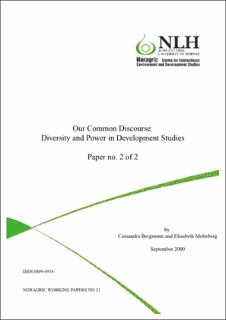| dc.contributor.author | Molteberg, Elisabeth | |
| dc.contributor.author | Bergstrøm, Cassandra | |
| dc.date.accessioned | 2020-08-07T11:15:54Z | |
| dc.date.available | 2020-08-07T11:15:54Z | |
| dc.date.issued | 2000-09 | |
| dc.identifier.issn | 0809-4934 | |
| dc.identifier.uri | https://hdl.handle.net/11250/2671201 | |
| dc.description.abstract | The political nature of Development Studies is discussed, examining relationships between individuals and groups of scientists, professionals and local people. Although the implications of these relationships to validity differ, there is a common problem of marginalization and bias. There is a danger of assuming balanced negotiations - that all actors are power equals and all voices equally legitimate. Language is a tool used both consciously and unconsciously to instill worldviews and secure positions. An open style of writing and the creation of a shared lexicon would provide a forum for diversity where contrasts are seen as enriching, rather than detracting from our message. Transfer of ideas is also possible through metaphors. Metaphors have a possibility for inspiring transformation of understanding through seeing one concept in terms of another. The transformative functions of metaphors are fundamental to enabling us to develop theory not attainable from within other delineated scientific practices. | en_US |
| dc.language.iso | eng | en_US |
| dc.publisher | Norwegian University of Life Sciences, Ås | en_US |
| dc.relation.ispartofseries | Noragric Working Papers;21 | |
| dc.title | Our Common Discourse: Diversity and Power in Development Studies | en_US |
| dc.type | Working paper | en_US |
| dc.subject.nsi | VDP::Social science: 200::Political science and organizational theory: 240::International politics: 243 | en_US |
| dc.source.pagenumber | 36 | en_US |
